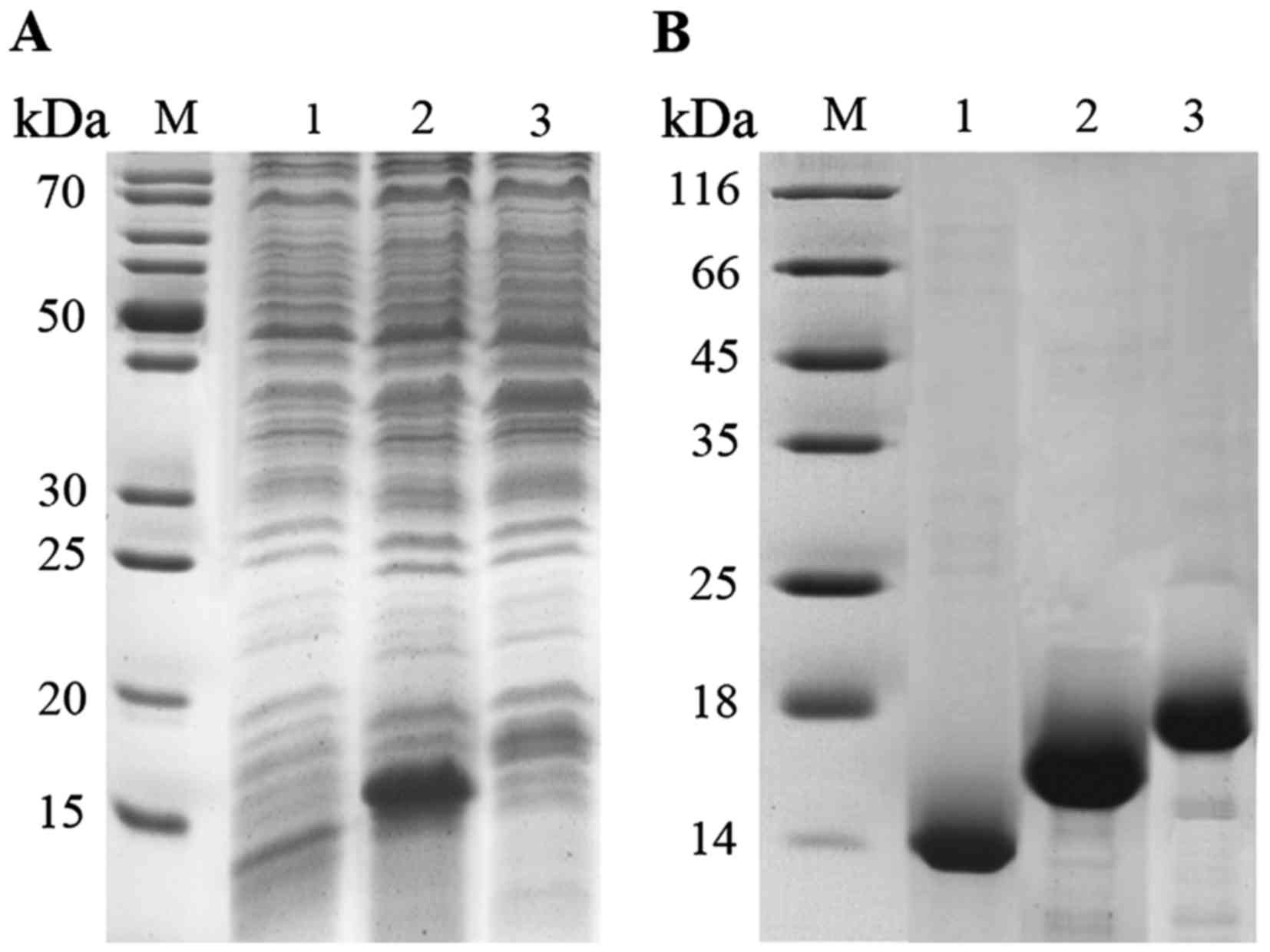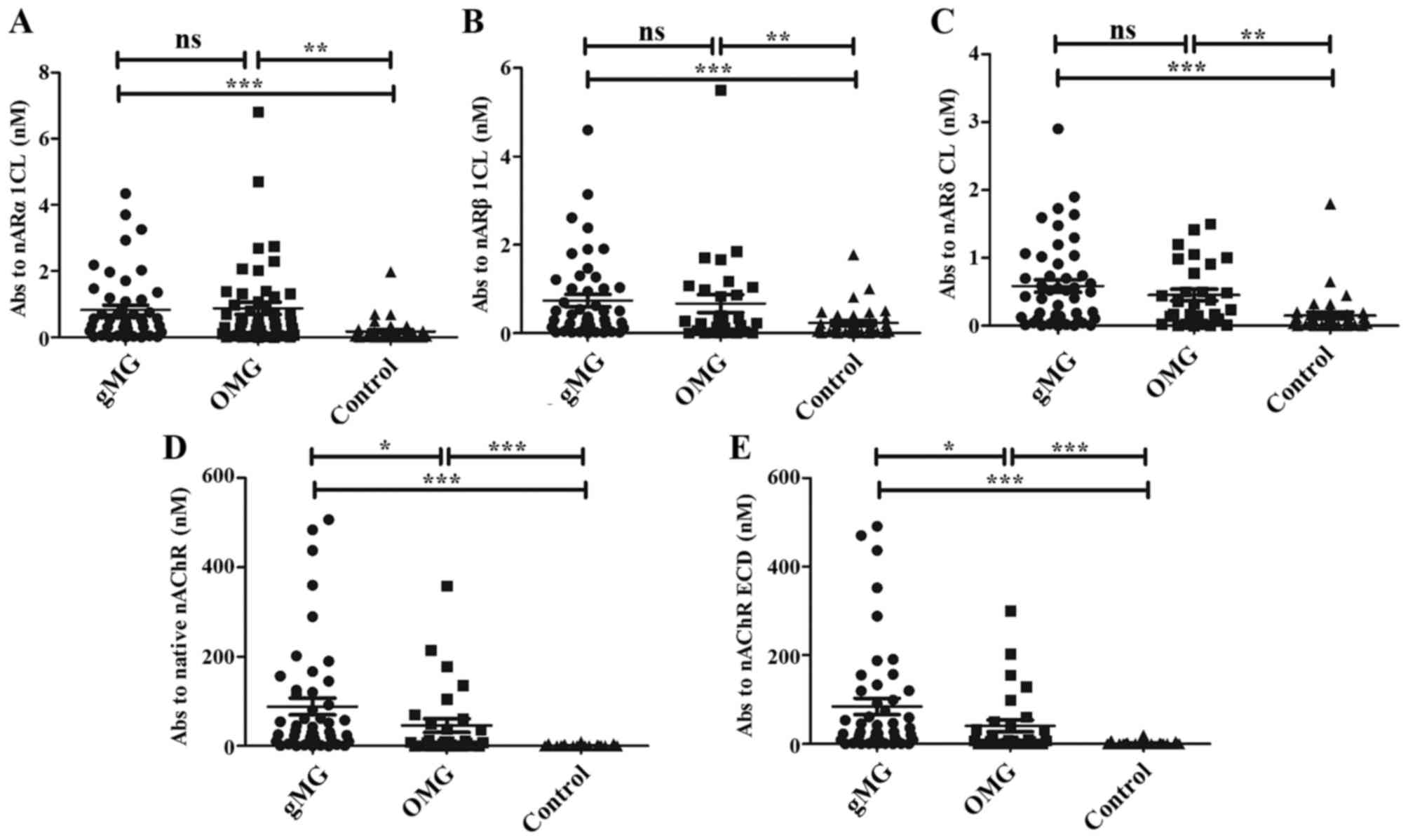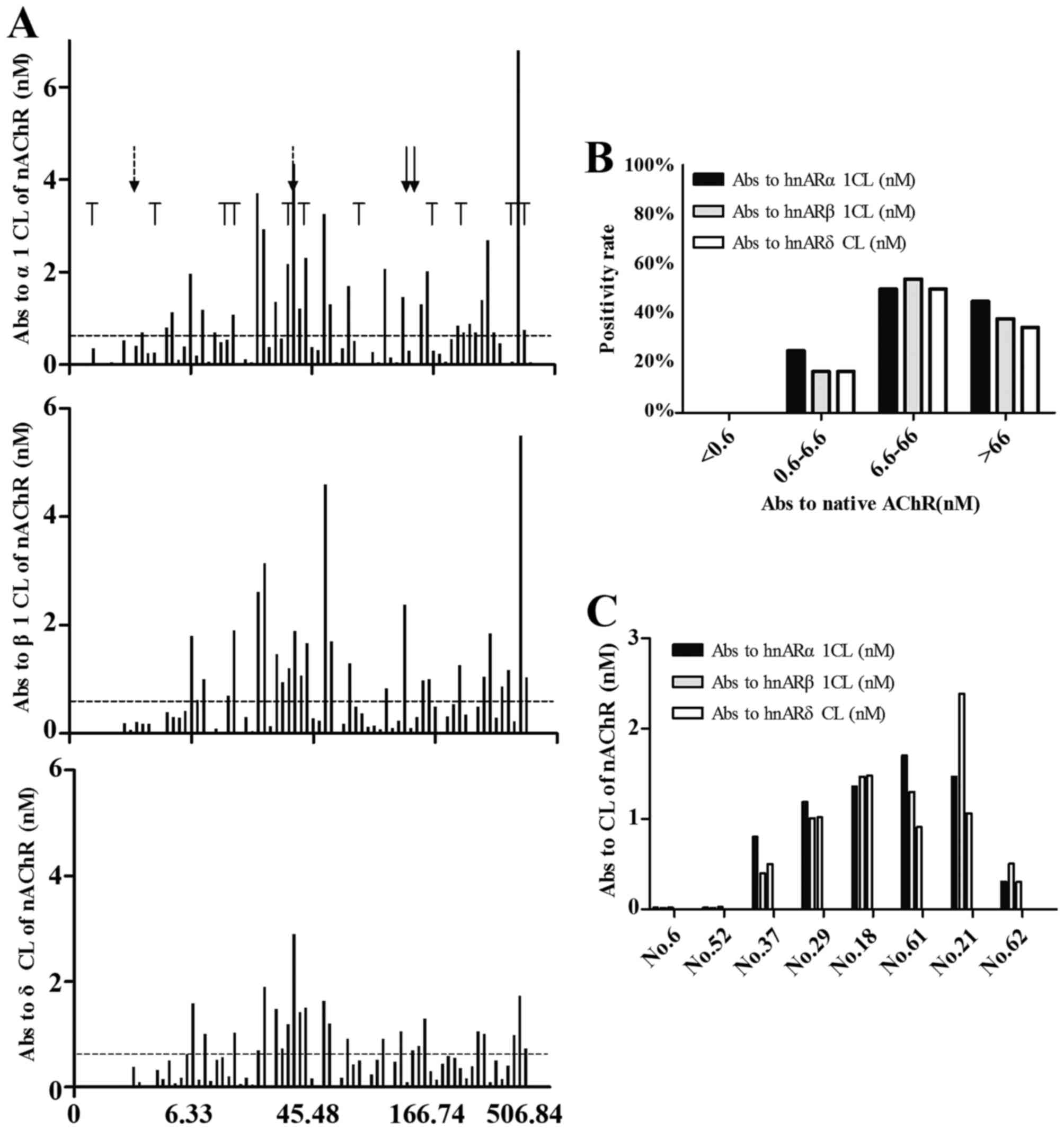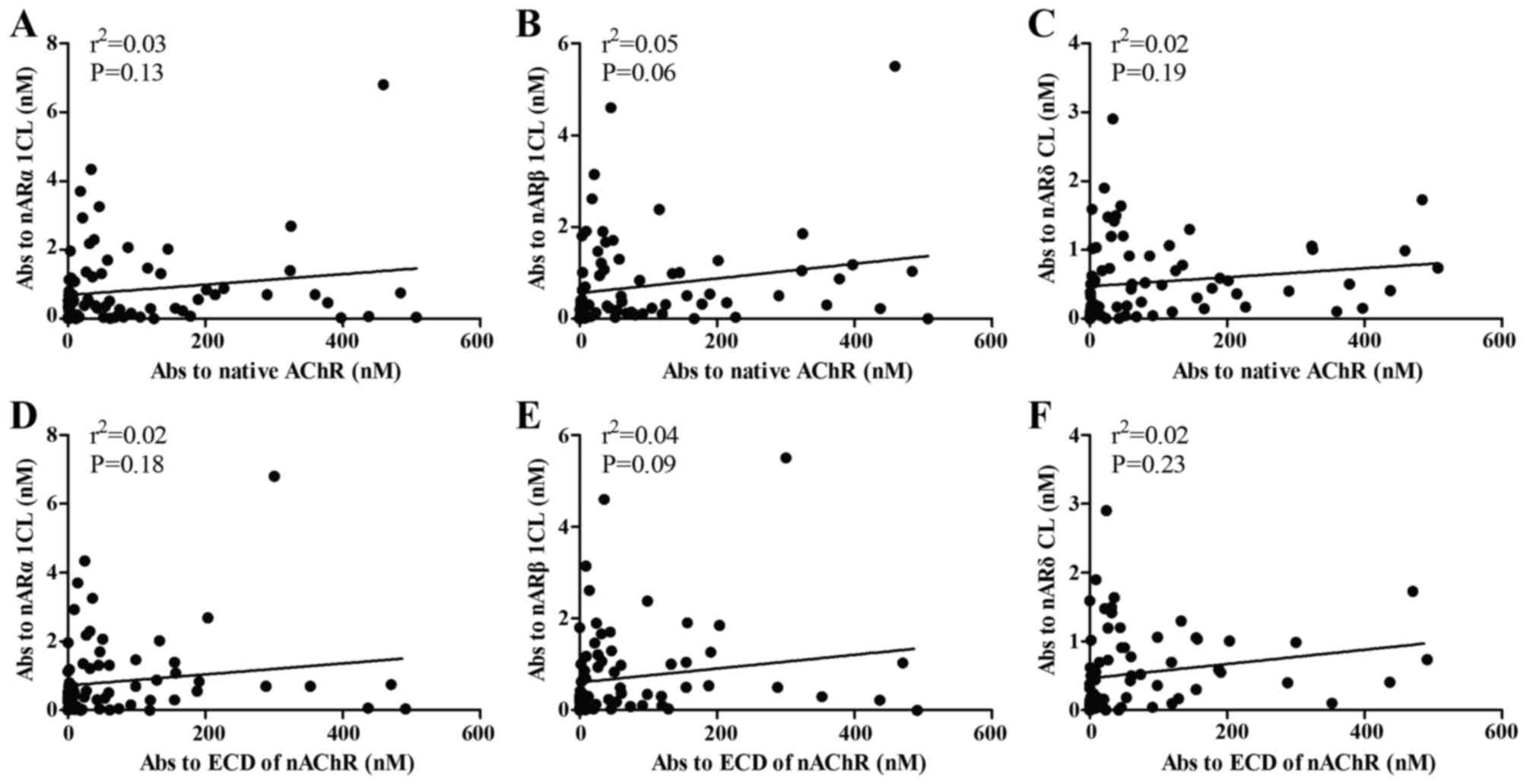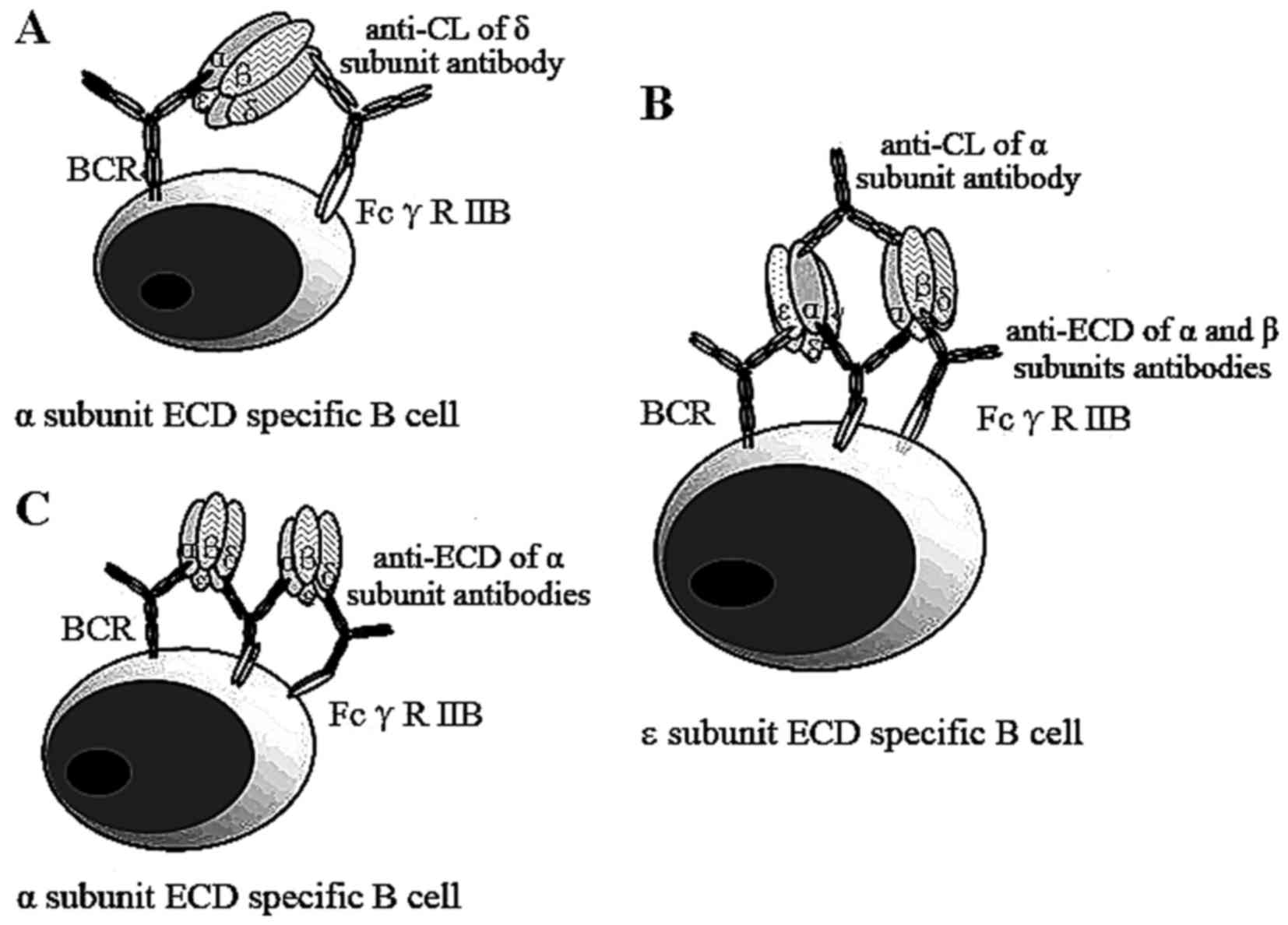|
1
|
Lindstrom JM: Acetylcholine receptors and
myasthenia. Muscle Nerve. 23:453–477. 2000. View Article : Google Scholar : PubMed/NCBI
|
|
2
|
Vincent A, Palace J and Hilton-Jones D:
Myasthenia gravis. Lancet. 357:2122–2128. 2001. View Article : Google Scholar : PubMed/NCBI
|
|
3
|
Huijbers MG, Lipka AF, Plomp JJ, Niks EH,
van der Maarel SM and Verschuuren JJ: Pathogenic immune mechanisms
at the neuromuscular synapse: The role of specific antibody-binding
epitopes in myasthenia gravis. J Intern Med. 275:12–26. 2014.
View Article : Google Scholar
|
|
4
|
Karlin A: Emerging structure of the
nicotinic acetylcholine receptors. Nat Rev Neurosci. 3:102–114.
2002. View
Article : Google Scholar : PubMed/NCBI
|
|
5
|
Scarselli M, Spiga O, Ciutti A, Bernini A,
Bracci L, Lelli B, Lozzi L, Calamandrei D, Di Maro D, Klein S and
Niccolai N: NMR structure of alpha-bungarotoxin free and bound to a
mimotope of the nicotinic acetylcholine receptor. Biochemistry.
41:1457–1463. 2002. View Article : Google Scholar : PubMed/NCBI
|
|
6
|
Lindstrom JM, Einarson BL, Lennon VA and
Seybold ME: Pathological mechanisms in experimental autoimmune
myasthenia gravis.I.Immunogenicity of syngeneic muscle
acetylcholine receptor and quantitative extraction of receptor and
antibody-receptor complexes from muscles of rats with experimental
automimmune myasthenia gravis. J Exp Med. 144:726–738. 1976.
View Article : Google Scholar : PubMed/NCBI
|
|
7
|
Tzartos SJ, Sophianos D and Efthimiadis A:
Role of the main immunogenic region of acetylcholine receptor in
myasthenia gravis. An Fab monoclonal antibody protects against
antigenic modulation by human sera. J Immunol. 134:2343–2349.
1985.PubMed/NCBI
|
|
8
|
Das MK and Lindstrom J: The main
immunogenic region of the nicotinic acetylcholine receptor:
Interaction of monoclonal antibodies with synthetic peptides.
Biochem Biophys Res Commun. 165:865–871. 1989. View Article : Google Scholar : PubMed/NCBI
|
|
9
|
Lindstrom J, Einarson B and Tzartos S:
Production and assay of antibodies to acetylcholine receptors.
Methods Enzymol. 74:432–460. 1981. View Article : Google Scholar : PubMed/NCBI
|
|
10
|
Gilhus NE and Verschuuren JJ: Myasthenia
gravis: subgroup classification and therapeutic strategies. Lancet
Neurol. 14:1023–1036. 2015. View Article : Google Scholar : PubMed/NCBI
|
|
11
|
Luo J and Lindstrom J: Myasthenogenicity
of the main immunogenic region and endogenous muscle nicotinic
acetylcholine receptors. Autoimmunity. 45:245–252. 2012. View Article : Google Scholar :
|
|
12
|
Lindstrom J, Luo J and Kuryatov A:
Myasthenia gravis and the tops and bottoms of AChRs: Antigenic
structure of the MIR and specific immunosuppression of EAMG using
AChR cytoplasmic domains. Ann N Y Acad Sci. 1132:29–41. 2008.
View Article : Google Scholar : PubMed/NCBI
|
|
13
|
Luo J and Lindstrom J: AChR-specific
immunosuppressive therapy of myasthenia gravis. Biochem Pharmacol.
97:609–619. 2015. View Article : Google Scholar : PubMed/NCBI
|
|
14
|
Tzartos SJ and Remoundos M: Detection of
antibodies directed against the cytoplasmic region of the human
acetylcholine receptor in sera from myasthenia gravis patients.
Clin Exp Immunol. 116:146–152. 1999. View Article : Google Scholar : PubMed/NCBI
|
|
15
|
Luo J and Lindstrom J: Antigen-specific
immunotherapeutic vaccine for experimental autoimmune myasthenia
gravis. J Immunol. 193:5044–5055. 2014. View Article : Google Scholar : PubMed/NCBI
|
|
16
|
Matney SE and Huff DR: Diagnosis and
treatment of myasthenia gravis. Consult Pharm. 22:239–248. 2007.
View Article : Google Scholar : PubMed/NCBI
|
|
17
|
Jaretzki A III, Barohn RJ, Ernstoff RM,
Kaminski HJ, Keesey JC, Penn AS and Sanders DB: Myasthenia gravis:
recommendations for clinical research standards. Task Force of the
Medical Scientific Advisory Board of the Myasthenia Gravis
Foundation of America. Neurology. 55:16–23. 2000. View Article : Google Scholar : PubMed/NCBI
|
|
18
|
Chang HW: Purification and
characterization of acetylcholine receptor-I from Electrophorus
electricus. Proc Natl Acad Sci USA. 71:2113–2117. 1974. View Article : Google Scholar : PubMed/NCBI
|
|
19
|
Greenwood FC, Hunter WM and Glover JS: The
preparation of I-131-labelled human growth hormone of high specific
radioactivity. Biochem J. 89:114–123. 1963. View Article : Google Scholar : PubMed/NCBI
|
|
20
|
Patrick J and Lindstrom J: Autoimmune
response to acetylcholine receptor. Science. 180:871–872. 1973.
View Article : Google Scholar : PubMed/NCBI
|
|
21
|
Tindall RS, Kent M and Wells L: A rapid
immunoadsorbent radioimmunoassay for anti-acetylcholine receptor
antibody. J Immunol Methods. 45:1–14. 1981. View Article : Google Scholar : PubMed/NCBI
|
|
22
|
Hayashi M, Takaoka T, Manabe K, Yoshinaga
J and Kida K: Comparison of antibody titer to human and rat
acetylcholine receptor in myasthenia gravis. Brain Dev. 17:38–41.
1995. View Article : Google Scholar : PubMed/NCBI
|
|
23
|
Oda K, Goto I, Kuroiwa Y, Onoue K and Ito
Y: Myasthenia gravis: antibodies to acetylcholine receptor with
human and rat antigens. Neurology. 30:543–546. 1980. View Article : Google Scholar : PubMed/NCBI
|
|
24
|
Kordas G, Lagoumintzis G, Sideris S,
Poulas K and Tzartos SJ: Direct proof of the in vivo pathogenic
role of the AChR autoanti-bodies from myasthenia gravis patients.
PLoS One. 9:e1083272014. View Article : Google Scholar
|
|
25
|
Heyman B: Antibody feedback suppression:
Towards a unifying concept? Immunol Lett. 68:41–45. 1999.
View Article : Google Scholar : PubMed/NCBI
|
|
26
|
Heyman B: Feedback regulation by IgG
antibodies. Immunol Lett. 88:157–161. 2003. View Article : Google Scholar : PubMed/NCBI
|
|
27
|
PLOS ONE Staff: Correction: Direct proof
of the in vivo pathogenic role of the AChR autoantibodies from
myasthenia gravis patients. PLoS One. 10:e01176732015. View Article : Google Scholar
|
|
28
|
Schürholz T, Kehne J, Gieselmann A and
Neumann E: Functional reconstitution of the nicotinic acetylcholine
receptor by CHAPS dialysis depends on the concentrations of salt,
lipid, and protein. Biochemistry. 31:5067–5077. 1992. View Article : Google Scholar : PubMed/NCBI
|
|
29
|
Chang HW and Bock E: Factors influencing
the stability of isolated acetylcholine receptor from Torpedo
californica. Neurochem Int. 2C:269–280. 1980. View Article : Google Scholar : PubMed/NCBI
|
|
30
|
Tzartos SJ, Morel E, Efthimiadis A,
Bustarret AF, D'Anglejan J, Drosos AA and Moutsopoulos HA: Fine
antigenic specificities of antibodies in sera from patients with
D-penicillamine-induced myasthenia gravis. Clin Exp Immunol.
74:80–86. 1988.PubMed/NCBI
|















